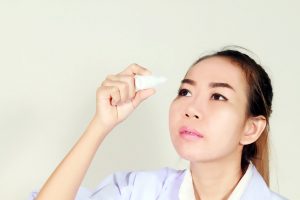
Dry eye is a disorder characterized by the inability to produce the right quantity and quality of tears necessary to sufficiently lubricate the eye. In a normally functioning eye, tears moisturize the cornea and protect it from foreign particles, but insufficient lubrication can lead to eye infection, pain and vision impairment.
Gender has a significant impact on the risk of dry eye, as women are at higher risk than men. According to the National Women’s Health Resource Center, approximately 6 million women have moderate to severe symptoms of dry eye syndrome, as compared to 3 million men.
Dry Eye Symptoms
Common symptoms of dry eye include stinging, burning, redness, pain and scratchiness. It can cause alternating periods of excess tearing and excessive dryness, blurred vision, or the sensation that the eyelids feel heavy.
Why Women Experience Dry Eye More Than Men
Hormonal fluctuations, especially in estrogen, are responsible for higher prevalence of dry eye in females. These changes are more extreme during pregnancy, menstruation and menopause, when levels of estrogen and progesterone taper off.
Other Risk Factors
Besides gender, other factors which may influence dry eye include refractive surgery such as LASIK, contact lenses, eye allergies, and inflammatory disorders like rheumatoid arthritis (Prevent Blindness). Additionally, medications like antihistamines, decongestants, antidepressants, birth control pills, anxiety medication, hypertension medication and hormone replacement therapy have been linked to dry eye.
What You can Do
Many people who suffer from dry eye just try to manage their symptoms with rewetting drops. However, it is important to see an ophthalmologist for a comprehensive eye exam. When you see the doctor, you can discuss your dry eye symptoms and evaluate various treatment options including dietary changes, vitamins, punctal plugs or medicated eye drops. The ophthalmologist may suggest that you talk with your primary care physician about your medications. One or more of your prescriptions could be making your dry eye worse.
